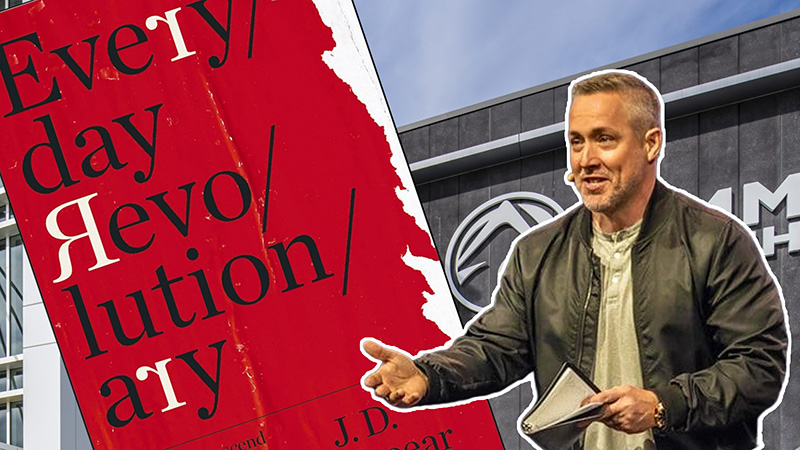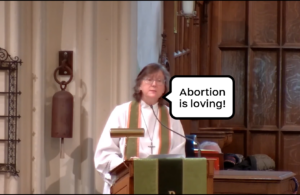Protestia has been covering J.D. Greear for almost a decade. Long before The Gospel Coalition began regularly publishing his essays and platforming his brand of “above-the-fray” Christianity, we were documenting the pattern that now defines his ministry. Back when this site operated under the Pulpit & Pen banner, Greear’s knack for public compromise and his allergy to clarity earned him our tongue-in-cheek “Worst Christian of the Year” award in 2019 in response to traditions like charging for Good Friday services and canceling the last church service of every December to make room for yearly giant Christmas productions combining “Angels We Have Heard on High” and Disney’s “Let it Go.”
While I can’t pinpoint the exact year Greear began formally writing for or affiliating with The Gospel Coalition, his voice has become central to its post-Keller identity. In many ways, Everyday Revolutionary reads as an application for the vacant throne of evangelical winsomeness left behind by the late Tim Keller. Keller built his reputation on cultured civility and urbane persuasion; Greear offers the same posture translated into megachurch pragmatism. His “beautiful life” theology is simply Keller’s “winsome witness” rebranded—polite, marketable, and perfectly suited to the institutional temperament of The Gospel Coalition.
His new book, Everyday Revolutionary: How to Transcend the Culture War and Transform the World, is not a call to courage but to caution. It is an apologetic for clerical disengagement dressed in pastoral warmth and Greek vocabulary. Greear has not written a manifesto for faithfulness in a fallen world. He has written a survival guide for remaining respectable within it.
The Thesis of Everyday Revolutionary
Greear’s argument turns on a single Greek word: kalos (καλός), meaning “beautiful” or “noble.” He tells readers that God’s plan for changing the world is not political activism but the display of kalos lives that make the gospel attractive to outsiders. Christians, he says, should stand out in Babylon through kindness, integrity, and quiet generosity rather than through public combativeness.
In Greear’s framing, pastors in particular must avoid allowing their pulpits to become “rallying points for one side of the political aisle.” The church’s mission, he insists, “is not to win culture wars but to make disciples.”
Greear acknowledges that Christians in a republic have civic responsibilities under Romans 13 and 1 Peter 2, but his treatment of those passages is brief and secondary. The real weight of the book lands elsewhere. His emphasis is on staying calm, staying winsome, and staying liked.
Kalos as a Marketing Device
The use of kalos gives Greear’s argument an air of novelty and biblical sophistication. By centering the book on a Greek term, he offers readers the sense that they are rediscovering a forgotten scriptural secret. Yet what he describes under the heading of kalos is simply the familiar “winsomeness” ethic that has dominated the evangelical establishment for two decades.
By dressing an old idea in biblical language, Greear transforms a public-relations strategy into a theological insight. The Greek word becomes a brand. It suggests that being attractive is not only strategic but divinely mandated. The move flatters both the scholarly and the casual reader. To seminarians, it sounds exegetical. To lay readers, it feels profound. In reality, it is neither. It is the well-worn idea that the gospel spreads best when the church is least offensive.
In the biblical sense, kalos can describe genuine virtue and excellence, but Greear turns it into a public-relations program. The beauty of holiness becomes the aesthetics of inoffensiveness.
The Pulpit and the Pew
Greear draws a sharp line between what he calls the pastoral office and the lay believer’s civic engagement. Pastors, he says, “officially represent Christ’s church” and therefore should avoid explicit political association. Lay Christians, however, may feel freer to be outspoken in the public square.
That distinction might sound prudent, but it revives the very clerical divide the Reformers dismantled. In Baptist polity, the pastor’s authority is ministerial, not magisterial. The pulpit’s task is to equip the saints for public faithfulness, not to stand aloof from it. When Greear elevates pastoral restraint as a spiritual duty, he recasts a theological office into a professional class.
This division conveniently benefits pastors of large, multi-site churches like Greear’s. The higher one’s public platform, the greater the incentive to remain broadly appealing. Silence becomes market strategy. Regular believers can take the social risks of speaking biblical truth in the workplace or online. The megachurch pastor can remain “above the fray,” preserving his reputation, publisher relationships, and conference invitations.
The Unqualified Problem
Greear does, on occasion, name evil clearly. He writes that “The Democratic Party has officially enshrined into its platform an unqualified affirmation of the murder of infants in the womb and a wholehearted embrace of gender and sexual rebellion.”
At first glance, this sounds strong. But notice the modifiers: “unqualified” and “wholehearted.” Greear seems able to speak plainly only when the left’s moral corruption is total and explicit. Anything less is treated as too complex for direct confrontation.
That habit of rhetorical charity flows only one direction. When Greear speaks of progressives, he adds qualifiers. When he speaks of conservatives, he drops them. As Megan Basham documented in Shepherds for Sale, Greear often portrays politically conservative Christians as “culture warriors” or “idolaters of power” without any comparable sympathy for their convictions.
The result is not neutrality but selective indignation. His so-called evenhandedness functions as tone management, protecting his credibility with cultural elites while implying that bold pastors on the right are the real problem.
Pastoral Responsibility and Civic Duty
In the United States, pastors are not state-appointed chaplains. They are self-governing citizens who share the same civic obligations as the people they shepherd. When Paul and Peter command believers to honor civil authority, they do not exempt leaders from that duty. In a republic, the citizen is part of the governing structure.
Greear’s vision lets pastors escape that responsibility by redefining civic speech as a lower calling for ordinary members. The shepherd becomes a public minimalist, free to remain quiet while the sheep do the heavy lifting of public witness.
This runs counter to Baptist history. The early Baptists in England and America were jailed for preaching Christ’s lordship into political realities. They did not believe the pulpit’s job was to stay neutral. They believed the pulpit’s job was to form consciences and embolden conviction.
The Megachurch Incentive
Greear’s entire model conveniently aligns with the logic of the multi-site megachurch. Broad appeal keeps attendance high, campuses funded, and publishers interested. Narrow conviction threatens all three.
For the professional influencer-pastor, “staying above the fray” is not simply a theological conviction but an economic necessity. Controversy risks alienating donors, denominational partners, and suburban families who equate gentleness with godliness. The easiest way to preserve reach is to spiritualize silence.
This is why Everyday Revolutionary feels less like a theological treatise and more like a leadership manual for managing public risk. It tells Christians how to appear courageous without suffering the consequences of conviction.
A Case Study in Abuse
The consequences of this clerical distance are already visible. The recent case of Daniel Keene, the Texas business owner reportedly disciplined by his church for public political statements, is a sobering example. His pastors treated civic engagement as an act of defiance rather than obedience. The false pulpit-and-pew divide provided the framework for that abuse. It allowed church leaders to act as guardians of institutional respectability instead of shepherds of conscience.
The truth versus love false dilemma is the bread and butter of church “discipline” in the winsome megachurch world, and Greear’s book promises to deliver the path to being a “holistic witness,” that is, to “speak accurately and courageously on every single cultural and theological issue” without “failing in the mission of Jesus.”
Conclusion
Everyday Revolutionary is written with warmth and sincerity, and it occasionally offers useful counsel on personal conduct. But its governing vision undermines the very courage it pretends to inspire.
By spiritualizing pastoral caution, Greear gives theological legitimacy to institutional self-interest. His Greek word adds polish, his pastoral tone adds plausibility, and his platform adds influence. But the result is a faith that costs the shepherd nothing and demands from the flock everything.
The church does not need more pastors who know how to stay above the fray. It needs men who will enter it, Bible in hand, and proclaim that Christ is Lord even when that claim collides with Caesar, culture, or publisher.
Greear’s revolution is quiet because silence is safe. The real revolution will begin when pastors stop treating safety as sanctification.






















One response to “Book Review: Everyday Revolutionary by J.D. Greear”
If only the apostle Paul had practiced kalos correctly, he could have been so winsome instead of provoking riots everywhere he went.